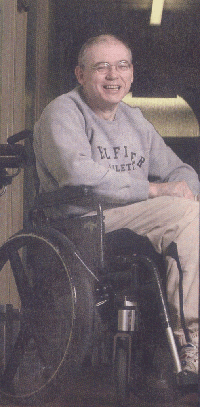Let me LIVE! - 2
"I've been quite nervous about the media interest in me, but it's a job that has to be done. I'm actually beginning to enjoy it. My only complaint is that some newspapers ask their photographers to take pictures of me looking miserable- and the whole point is I want to live. It's positive!"
Leslie's campaign led to a hearing in the High Court in March -but judgment has been reserved while the implications of a similar case in Europe are considered. If victory is not forthcoming in the short term, Leslie knows the appeals process could take 10 years to progress through the House of Lords and, ultimately, the European Court of Human Rights.
"So, are you prepared to go the distance?" I asked him.
"If I've not been put to sleep by a doctor by then, yes!"
he jokes.

"I made friends with the other volunteers, who've all got disabilities and now I've got friends who understand what I'm going through. Finally you realise that you have to make the most of what you can do."
New Social Services funding means Leslie has recently been able to take on a personal assistant. "That's opened up a heck of a lot of doors for me. I went on the bus for the first time since I was a postman the other day, which may not sound like much to you, but it was quite a big deal for me!
"With the positive outlook I now have, life's a lot easier. I've made a lot of really good friends-some of the opposite sex as well-and that's made a big difference; it helps me stay positive."
Leslie's other new lease of life is campaigning alongside
disability rights group ALERT for a judicial review of General
Medical Council guidelines on the treatment of terminally ill
patients. Leslie and ALERT (with the Disability Rights Commission
as an `interested party') are challenging GMC guidelines giving
doctors the right to decide whether or not to continue feeding
patients who are no longer able to eat or drink unaided or communicate
their wishes.
The guidelines stipulate that a doctor only has to consider the
views of the patient or their family, they are not bound them.
If a doctor feels the sustaining treatment they can withdraw
hydration and nutrition.
"If you want to refuse medical treatment or have it withdrawn the doctor has to respect your wishes and do what you say. But you've no such right if you want nutrition and hydration to continue. The doctor can refuse it at anytime.
"There may well be a time when I'll be almost comatose, my communication skills will be nil; but my mind will still be alert," says Leslie. "I'll be acutely aware every second that if the doctor withdraws hydration and nutrition I'll be dying and it could take two to three weeks. I don't think that's a dignified way to die, or how a vulnerable person should be treated. If you did that to a dog or a horse you'd be upon a charge. So how come it's acceptable to put a human being through that?"
For Leslie, consent is the key: "As a disabled person, I've been talked over, talked at, discussed while I'm in the room and totally ignored. Quite often I've not been asked for my consent, just presented with decisions.
"It's about a decision and who takes it, but it's also about the right to life. You hear in the news about people who want the right to die, but I want the right to live, even if it's just for one more week. I want to make the decision myself and I wouldn't disrespect anybody who makes the other choice."
Articulate and persuasive, Leslie has taken on a very public role in the campaign, despite certain reservations about his new-found celebrity